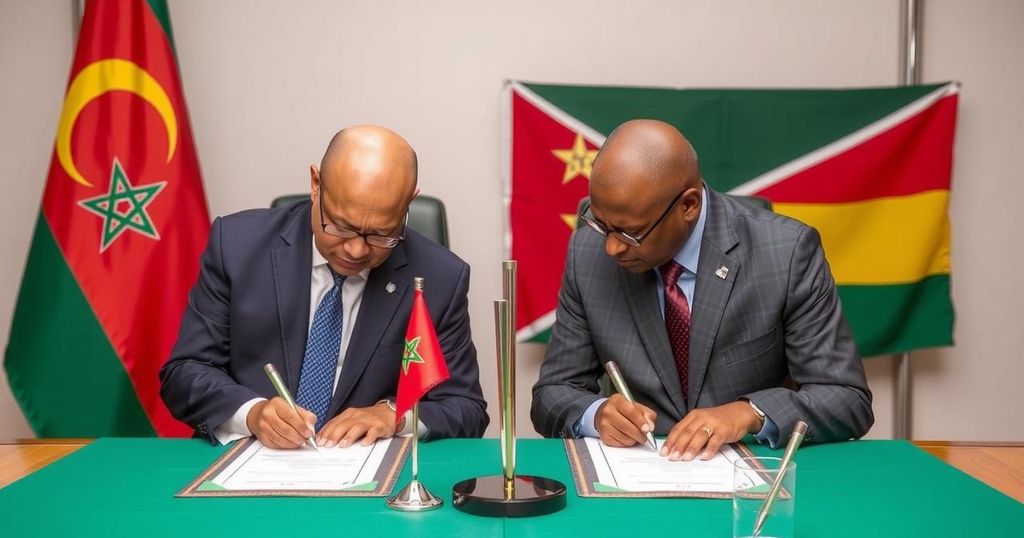Global news
AFRICA, ALGERIA, DIPLOMACY, ECONOMIC INTEGRATION, HA, HAIMBE, HAKAINDE HICHILEMA, HICHILEMA, JOINT COOPERATION COMMISSION, LAAYOUNE, MAGHREB ARABE PRESS, MAP, MOHAMMED VI, MOROCCO, MU, MULAMBO HAIMBE, NASSER BOURITA, POLISARIO FRONT, REGIONAL COOPERATION, REGIONAL SECURITY, SAHARA, SOVEREIGNTY, ZAMBIA
Fatima Khan
0 Comments
Morocco and Zambia Strengthen Bilateral Relations with New Agreements
Morocco and Zambia have signed seven cooperation agreements in Laayoune, aimed at enhancing bilateral relations across sectors such as tourism, renewable energy, and education. The agreements were formalized during the first Joint Cooperation Commission meeting, co-chaired by both nations’ foreign ministers. The collaboration reflects mutual support for Morocco’s autonomy plan for the Sahara amidst ongoing territorial disputes and signifies strong commitment to regional and international challenges.
On Friday, Morocco and Zambia took significant steps to deepen their bilateral relationship by signing seven cooperation agreements in Laayoune, a city within the disputed Sahara region. The agreements, which encompass various sectors including tourism, renewable energy, vocational training, justice, investment, and higher education, were formalized during the first session of the Joint Cooperation Commission. This session was jointly led by Moroccan Foreign Minister Nasser Bourita and Zambian Foreign Minister Mulambo Haimbe, as reported by the Maghreb Arabe Press.
The ministers highlighted the critical nature of establishing a multifaceted partnership, resonating with the mutual aspirations of King Mohammed VI of Morocco and President Hakainde Hichilema of Zambia. Furthermore, Foreign Minister Haimbe presented a written communication from President Hichilema to King Mohammed VI, which underscored Zambia’s recognition of Morocco’s autonomy proposal regarding the Sahara. He commended the increasing international support for this initiative and acknowledged the role of King Mohammed VI in promoting Moroccan sovereignty in the region.
These diplomatic developments are set against the backdrop of an enduring territorial dispute over the Sahara, where Morocco advocates for regional autonomy while the Polisario Front, supported by Algeria, seeks a referendum on self-determination. The newly signed agreements illustrate both nations’ dedication to enhancing bilateral cooperation and effectively tackling shared regional and global challenges. Minister Haimbe also expressed Zambia’s support for UN-led initiatives aimed at achieving a “realistic, practical, and sustainable solution” to the Sahara conflict. The implementation of such agreements promises to strengthen economic, social, and educational collaboration between Morocco and Zambia, thereby reinforcing their partnership within the wider region.
The recent signing of cooperation agreements between Morocco and Zambia takes place within an intricate geopolitical context marked by the unresolved territorial dispute over the Sahara. Morocco maintains claims to this region, promoting an autonomy plan aimed at reinforcing its sovereignty. In contrast, the Polisario Front seeks independence for the Sahara, advocating for a referendum that aligns with self-determination principles. This discord has not only regional implications but also resonates in international diplomatic spheres, influencing alliances and partnerships across Africa and beyond. The cooperation agreements signed in Laayoune signify both nations’ commitment to move forward together in light of these complex dynamics, reflecting the strategic interests they share against a backdrop of broader global challenges.
The formalization of seven cooperation agreements between Morocco and Zambia represents a significant advancement in diplomatic and economic relations between the two nations. These agreements, spanning diverse sectors, underscore a joint commitment to strengthening ties amidst the ongoing territorial dispute over the Sahara. Both parties expressed a unified vision for enhanced collaboration while seeking a resolution to the conflict. Such initiatives not only promise to bolster bilateral relations but also demonstrate an evolving geopolitical landscape in Africa that prioritizes partnership and shared objectives.
Original Source: newscentral.africa




Post Comment